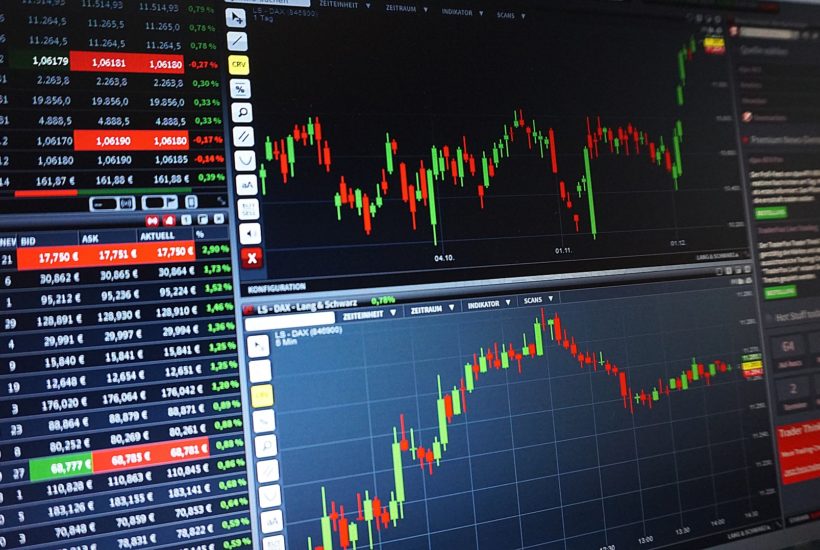Featured
Top 10 Forex Risks To Consider Before Starting Currency Trade
This article shows you the fx risk to expect while performing forex trade and how to mitigate them and ensure you do not lose your income. What are the risks that you should consider before you start trading? How to investing forex trade currency pairs? Tips for safe trading. How to be a better forex trader?

There are several forex risks that one needs to be aware of while trading in currency. In as much as there is much money to be made in the forex market, one must understand the risks involved in the market and prepare one’s mind to face the reality should one be confronted with any of the challenges in the course of doing business.
Forex trade is not always a bed of roses; the ecosystem is so volatile that the possibility of losing one’s hard earned income is quite high. The volatility of the market makes it almost impossible to predict what could happen in the next minute. In this post, we shall take a look at various risks one could be exposed to, some tips to enable you trade safely, forex trading FAQs, and a lot more.
Risks you must consider
If you wish to do your currency trade with safety and not be exposed to the danger of losing your money, you need to be familiar with the following risks associated with the business irrespective of the platforms where your trading is carried out.
Credit Risk
Credit risk occurs when a party to a trade finds it impossible to pay the other party. One reason why this could happen is if one party is bankrupted or defaults in making his payment. In order to avoid this, you must understand the rules and regulations binding on the forex broker you are dealing with.
Ideally, every country has some forms of regulation in place to check the activities of the forex brokers that operate within them. They ensure that brokers have adequate reserve in case the other party to the trade is unable to cover their trading loses.
Volatility Risk
The forex market is highly volatile and volatility has a way of influencing the movement of prices and the profits or losses one could make. Volatility is not always about the negative trends in the market; there are equally the positive sides to it.
Making significant gains would almost be impossible if there were no volatility in the ecosystem. However, the risk of losing huge amount of money increases when there are high impact news events. Traders need to be watchful because periods like these can affect the position of a trader unfavorably.
Broker Risk
While some forex brokers are highly regulated, some others are not. What this implies is that you have more security patronizing the regulated broker than the unregulated ones. The kind of brokers you deal with determines how your working capital is managed.
In order to not fall into the wrong hands, you need to do due diligence of researching your broker before entrusting them with your money. Some smaller brokers (especially those domiciled in offshore locations) shy away from being regulated because of the cost of obtaining operational licenses in their country. Moreover, regulators always require that they meet certain capital obligations to be allowed to operate.
Each country has specific rules that govern its forex market. In order to ensure the safety of your fund, it is advisable to do business with brokers that are regulated by government body.
Exchange Rate Risk
The dynamic changes in the value of currency expose those currencies to certain levels of risk. Companies operating in multiple countries or exporting their products regularly are particularly exposed to exchange rate risk.
The exchange rate changes in the country where a multi-national company operates in and that of the country in which it does business play a great role in determining their profits and margins.
Margin Risk
Forex trade can considerably be influenced by margin or leverage risk. Margin trading enables you to make use of leverage. Generally, it is essential that you put up just a part of the entire value in good faith when about to place a forex trade. But when you are able to make use of a borrowed capital to improve your position size, then one can say that your trade is leveraged.
Margin requirement is the amount you are mandated to place upfront. Though some brokers permit their forex trading clients to leverage up to 100:1, it is not to say that using it may always be good for you.
Counterparty Risk
The company that offers the asset to the investor in a financial transaction is referred to as the counterparty. Counterparty is therefore, the risk of non-payment from the broker or the dealer in a particular transaction. The counterparty risk may result from the market maker’s solvency in spot currency trading. When volatile conditions arise in the market, the counterparty fail to or are unable to stick to the condition of the contract.
Leverage Risk
Leverage necessitates a little initial investment otherwise known as a margin, in order to have access to sizeable trades in foreign currencies. When there is a little price instability, this can lead to margin calls which would need the investor to disburse an extra margin. Using leverage insistently in market conditions that are volatile will lead to significant losses more than the investment initially made.
Transaction Risks
These is exchange rate risk which usually comes as a result of the differences in time between the commencement of a contract and its settlement. Exchange rates can sometimes change before trades have settled, since forex trade is done on a 24 hour basis. As a result, prices are not always stable; currencies at different times of the day may trade at different prices. Transaction risk gets higher when the time differential between when a contract is entered and settled is greater.
Country Risk
Most developing countries fix their exchange rate to a world leader such as the dollar or pound sterling. To ensure that fixed exchange rate is sustained, the central banks need to have enough reserves in place. Recurrent deficits in balance of payment can trigger a currency crisis and lead to currency devaluation. This may adversely affect prices and forex trading.
Since investing is speculative in nature, if an investor feels that the value of a currency is going to dwindle, they may start withdrawing their assets; this leads to more devaluation of the currency. In the forex trade, liquidity danger and credit risks are made worse by currency crises. This also makes a country’s currency less attractive.
Interest Rate Risk
A rise in a country’s interest rates attracts more direct foreign investments since investors are assured that they will get higher returns from investing in the country’s assets. This investors’ confidence further makes the currency of that country stronger in value.
On the contrary, when interest rates fall, investors withdraw their investment thereby bringing about a fall in the strength of the currency. The differential between currency values can easily bring about remarkable change in forex prices, as a result of the effect of interest rates on exchange rates. Having examined the various risks, it’s time to move ahead to examine the kinds of exposures in the forex market.
Currency exposure
This is a situation where an investment or part of an investment is in foreign currency and becomes exposed to risk when the value of that currency experiences some changes. There are basically three types of Currency exposure and they include:
Transactional exposure
This is as a result of an actual transaction occurring in business which involves foreign currency. If a foreign currency transaction and the currency market shift in a direction that is not favorable, it can easily defeat the chances of making profits, which is primarily the essence of the monetary transaction.
This kind of foreign currency exposure usually comes up when there is payment for imported goods or services, foreign debtors of sale, payment towards the EMIs of debts, receipt/payment of dividend, etc.
Translation exposure
The other name for this type of exposure is accounting exposure. This is due to the fact that the exposure results from translation of books of accounts into the home country. Translation activity is performed on account of reporting the books to legal bodies or to the shareholders.
Loses or gains resulting from translation exposure usually don’t have more meaning over and above the reporting requirements. If the currency market experiences a favorable change in the following year, the exposure can be overturned.
Economic exposure
Foreign exchange controls the value of a firm. A firm’s value is the function of operating cash flows and the assets it possesses. Economic exposure has higher impact than the two aforementioned exposures. It can determine the operating cash flows and the assets of the firm. It is usually difficult to identify and measure this type of exposure.
Tips for safe trading
Since forex trading involves currency exchange risk, every trader needs to have some tips for mitigating the risks in order to prevent losing huge sums of money while trading. Some of the tips to follow include:
Choose the right bet size: make sure to check the live currency rates before proceeding to choose the right bet size. Avoid a position which is too large compared to your account size.
Limit forex trade: to avoid possible damage, you should dedicate a few percentage points of your entire portfolio to forex trading.
Set some limits: to reduce the level of damage, it is necessary for you to set a stop-loss order in place, to enable you exit a position in case a particular price does not favor you.
How to be a better forex trader
In order to be a better forex trader, the following guidelines can really be of help to you:
- Check your emotions
The tendency for a new trader to place trades based on emotion is usually very high, especially after making a few successful trades. This increases the risk of losing all of one’s investments. You must avoid plunging in all your money after a few successes or losing hope too easily when you experience a few failures. Not checking your emotion could expose you to high fx risk.
- Be smart
One way to show your smartness is to start with little amount and minimize losses even though your profits will be small. It is better to earn small profits than lose all your money.
- Practice makes perfect
It is quite understandable that the forex market is highly volatile and no one can easily predict price movements. However, to be on the safe side, it is good for one to practice in demo environment and understand the nitty-gritty of the business before graduating to live trade. This helps to reduce losses.
- Appraise financial standing
Make sure you have evaluated the risk involved in the market and you are ready to go ahead with the amount of money you are about to invest in the business before actually going ahead. You could lose money that is worth a fortune to you.
- Look for a dependable broker
Money is hard to get and you wouldn’t want to throw your money away. Do you? Online forex trading is carried out through a broker; you need to carry out extensive research to be sure who your broker is before using their platform.
One way to be sure of your potential broker is to look up their trading record, the commissions and the spreads they collect, their trading platforms, deposit and withdrawal methods, and also get in touch with traders who are with the broker to ascertain how efficient they are at filling orders.
Forex Trading FAQs
- Can anybody trade forex?
Though the forex market is open to everybody, only those who have basic understanding of forex trading should trade. You are going to lose your money if you have no knowledge of how things are done.
- What are the trading hours on Forex?
Forex trading is usually available 24 hours a day from Sunday 5:00PM EST to Friday 4:00PM EST.
- Can one trade forex on weekends?
No. Forex trading usually closes on Friday afternoon and reopens on Sunday evening.
- What is the minimum starting income for forex trade?
The minimum amount needed to start forex trade depends on the broker. While a lot of brokers accept a minimum of $100, others are willing to take something less. However, most brokers allow you to use the demo account first to understand how things work before putting your money.
—
(Featured image by Csaba Nagy via Pixabay)
DISCLAIMER: This article was written by a third party contributor and does not reflect the opinion of Born2Invest, its management, staff or its associates. Please review our disclaimer for more information.
This article may include forward-looking statements. These forward-looking statements generally are identified by the words “believe,” “project,” “estimate,” “become,” “plan,” “will,” and similar expressions. These forward-looking statements involve known and unknown risks as well as uncertainties, including those discussed in the following cautionary statements and elsewhere in this article and on this site. Although the Company may believe that its expectations are based on reasonable assumptions, the actual results that the Company may achieve may differ materially from any forward-looking statements, which reflect the opinions of the management of the Company only as of the date hereof. Additionally, please make sure to read these important disclosures.

-

 Cannabis3 days ago
Cannabis3 days agoCannabis Company Adopts Dogecoin for Treasury Innovation
-

 Biotech1 week ago
Biotech1 week agoPfizer Spain Highlights Innovation and Impact in 2024 Report Amid Key Anniversaries
-

 Markets5 days ago
Markets5 days agoStock Markets Surge Amid Global Uncertainty, But Storm Clouds Loom
-

 Africa2 days ago
Africa2 days agoMorocco Charts a Citizen-Centered Path for Ethical and Inclusive AI
























